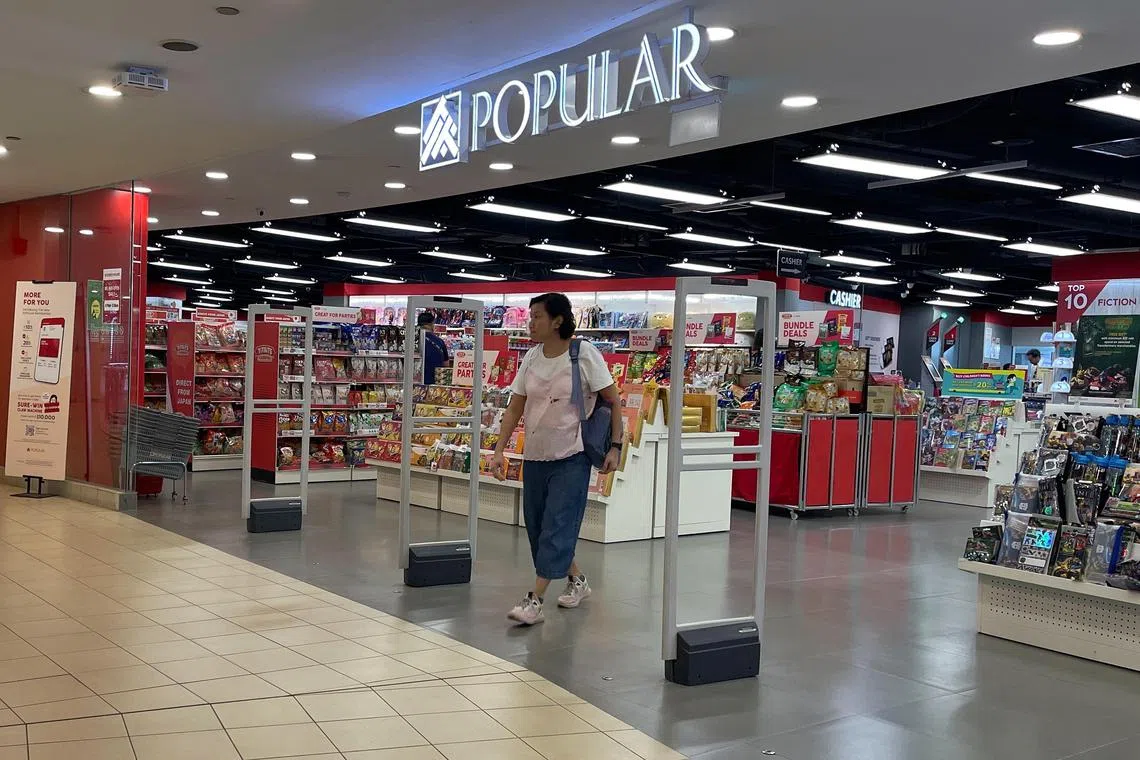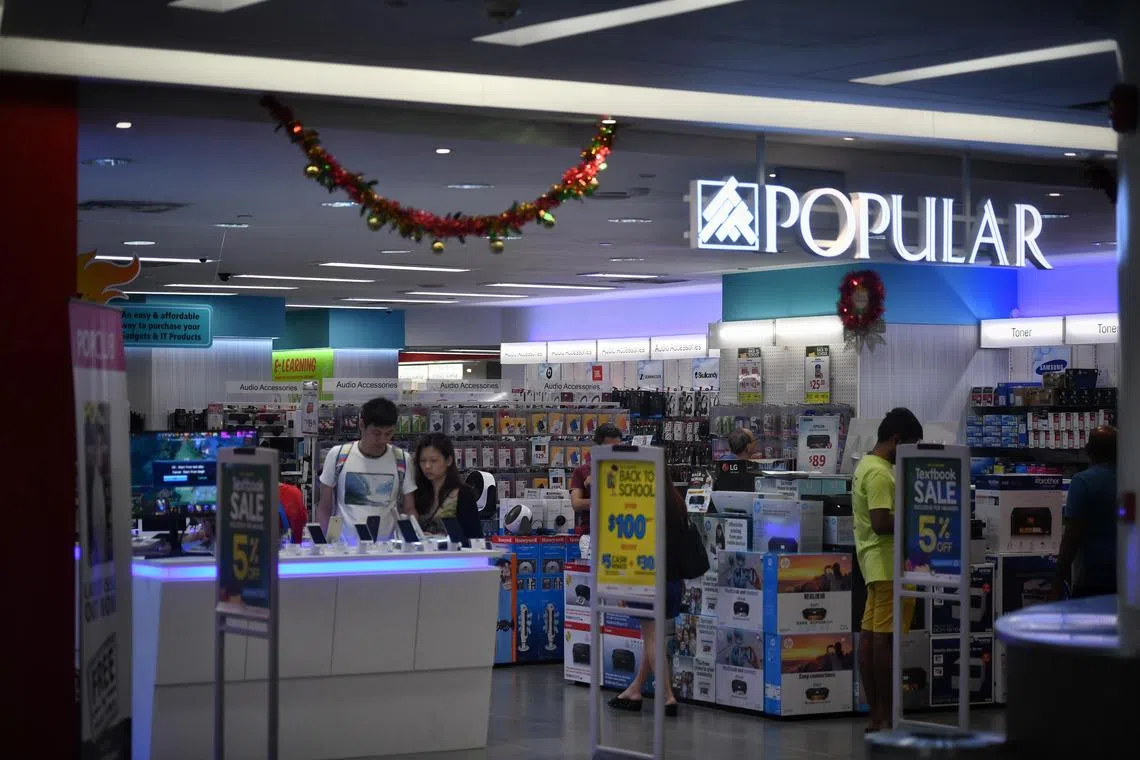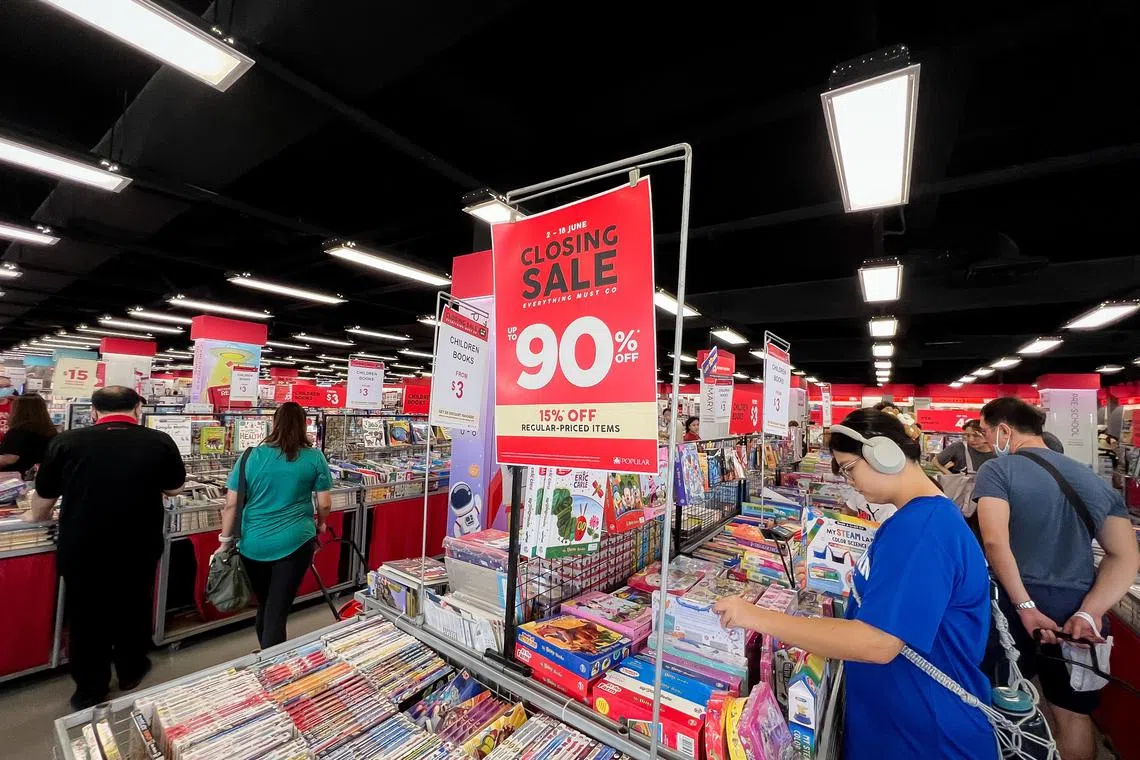Not just books: The changing face of Popular bookstore
Sign up now: Get ST's newsletters delivered to your inbox

The change in consumer habits has prompted Popular to transform from a traditional bookstore to a one-stop shop.
ST PHOTO: GIN TAY
SINGAPORE – For generations, home-grown bookstore Popular has been known as the go-to place for Singaporeans to get their hands on stationery and school assessment books.
But over the years, Popular has diversified its product offerings to include non-book merchandise, said its spokesman on Tuesday in response to The Straits Times’ queries, following news of the closure of its Marine Parade outlet after 37 years, on June 18
Today, its product categories include books (English, Chinese and assessment), stationery, gadgets and IT merchandise (including small domestic appliances such as fans, security cameras and air fryers), and tidbits. These are available at all of its 28 outlets, except for Chinese books, which are available at seven stores.
“The change in consumer habits has prompted us to transform from a traditional bookstore to a one-stop shop. We changed our product offerings and services so that we can remain relevant in this fast-changing retail industry,” said the spokesman.
Keeping up with the times
Popular’s story began in 1924 when its late founder Chou Sing Chu started Cheng Hing Company, which distributed Chinese storybooks, among other things.
The Popular Book Company was later established in 1936 as a retail channel for Chinese books.
Over the years, it has revamped its bookstores to keep up with the times.
In 2015, it began selling tidbits, as well as a comprehensive range of IT-related products such as computer keyboards.
In 2017, Popular customised at least two of its storefronts
In October that year, its store in The Clementi Mall reopened with gadgets and IT products, instead of books, displayed at its storefront.
Over at Jurong Point, its store was overhauled in August that year, focusing on stationery and offering a range of school and craft supplies.
When asked what kind of trend Popular has seen among consumers over the years, its spokesman said it was their changing reading habits.
“They are reading, but they are reading fewer physical books as a reading material,” she said, adding that other reading materials among consumers include news and articles on social media and websites.
“In order to survive in the ever-changing retail industry, we must go along (with the times) and serve what the consumers want (in order for them) to continue buying from us. We observed that our consumers have shown great interest in non-book merchandise such as (IT) gadgets.”

The Popular bookstore in The Clementi Mall reopened in October 2017 with gadgets and IT products displayed at its storefront.
PHOTO: ST FILE
Dr Seshan Ramaswami, Associate Professor of Marketing Education at Singapore Management University, noted that Popular has added many products such as electrical appliances as well as computer and audio hardware – items that are not traditionally sold in bookstores – to stay relevant as a retailer. He also noted that Popular has widened its selection of snacks and sweets.
“But when a retail brand expands by widening the product assortment, it can lose its distinctive positioning. It is difficult to be competitive against specialised electronic stores and convenience stores selling snacks and sweets in a far more focused manner,” he said.
Closure of Marine Parade outlet
On June 2, Popular posted on its Facebook page that it will be shutting its 17,000 sq ft outlet in Marine Parade on June 18.
Asked about the closure of this outlet, the Popular spokesman said rising costs of rent and labour are one of the main challenges for a retailer.
“It is increasing every year and this is what we face on a regular basis. Recruitment has also been challenging as there is a shortage of talent in the service sector of the market,” said its spokesman.
The spokesman also added that footfall at the Marine Parade outlet began to decline drastically in 2018 and 2019, and when the Covid-19 pandemic struck in 2020. It has not recovered since then.
“The closure was a strategic decision made to optimise our resources operations and allocate resources more effectively. This decision was not an easy one, but it is a necessary one for the health of our business.”
Its spokesman declined to comment on the total number of employees at the outlet, but said that it will be reallocating all existing staff to other stores, based on the store that is nearest to where they live.
What’s next for Popular?
Over the past few years, some well-known bookstores such as Borders have fallen victim to the strong winds buffeting Singapore’s book industry
Popular has also closed some of its outlets, including one at Thomson Plaza in 2019 and another at IMM in 2021.
Commenting on Popular’s bookstore closures, Ms Maggie Au, course chair of Diploma in Marketing at Temasek Polytechnic’s School of Business, told ST that in the new era of retail, the reach of retailers to their target customers is less defined by the number of physical stores the brands have.
Instead, it should be focused on creating a seamless and integrated customer experience through the different distribution channels, she said.
For example, Popular could offer a same-day delivery service for online purchases, among other things, Ms Au suggested.
“When customers go to Popular’s physical stores to buy items, they would take their purchases home with them immediately.
“Hence, as their retail strategy seems to be a shift to an online one, offering same-day delivery will emulate the shopping experience,” she added.

People shopping in the Popular book store at Marine Parade Central, on June 9, 2023. The store will be closing down on June 18.
ST PHOTO: GAVIN FOO
SMU’s Dr Ramaswami said that Popular’s multiple heartland locations make its outlets easily accessible to a large proportion of school-going children and their parents.
However, e-commerce platforms like Shopee and Amazon, and specialised stationery suppliers such as Home n Office and Stationery World, are difficult for Popular to compete against, said Dr Ramaswami, as these platforms do not have overheads of maintaining prime retail locations as well as sales and customer service staff.
He noted that bookstores such as Borders, Kinokuniya, Times, and MPH, and music stores, including HMV and T ower Record s, closed some or all of their outlets here.
Popular’s closure of several of its outlets is a continuation of this longer-term trend,
Popular is best served concentrating on the digital product and service needs of its consumers – focusing more on electronic gadgets, among other things, he said.
He added that the assessment book business will also eventually die out in its physical form as such materials are increasingly available online.
“Any product that is digitisable, and hence transmissible and usable without a physical form – such as books, magazines, software, music, video – will eventually be digitised. And it is inevitable that the assessment book business will be entirely digitised in the future,” said Dr Ramaswami.

People leaving messages on a “memory wall” outside the Popular bookstore at Marine Parade Central, which will be closing down on June 18.
ST PHOTO: GAVIN FOO
Popular could also sharpen and improve its online store, said Dr Ramaswami.
For example, the online store can focus on fulfilling the needs of students and office workers by selling stationery and electronic gadgets that are useful to students and office workers, that it did so well in its brick and mortar version, he added.
“Their physical presence may be reduced to a few flagship stores in central locations, with the rest of the business coming online, where it can aim for a focused depth and breadth of assortment based on its very good understanding of Singapore consumers gained over decades of operation,” said Dr Ramaswami.
To housewife Samantha Lim, the home-grown store will remain popular.
The 38-year-old, who usually buys stationery for her seven-year-old son, said: “I find it convenient that I can look at other things like powerbanks or computer mice when I go to Popular, as sometimes I am busy and might not have time to go to other electronics stores. So it’s a place where I can shop for many things at one go.”



